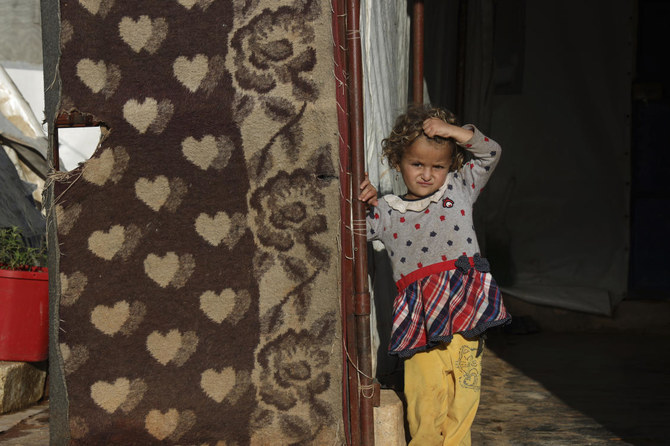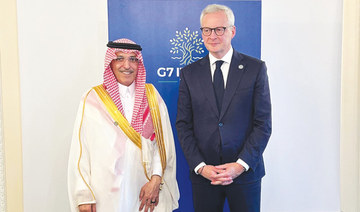BEIRUT: Living in a tent in rebel-held northwestern Syria, Rudaina Al-Salim and her family struggle to find enough water for drinking and other basic needs such as cooking and washing. Their encampment north of the city of Idlib hasn’t seen any aid in six months.
“We used to get food aid, hygiene items,” said the mother of four. “Now we haven’t had much in a while.”
Al-Salim’s story is similar to that of many in this region of Syria, where most of the 5.1 million people have been internally displaced — sometimes more than once — in the country’s civil war, now in its 14th year, and rely on aid to survive.
UN agencies and international humanitarian organizations have for years struggled with shrinking budgets, further worsened by the coronavirus pandemic and conflicts elsewhere. The wars in Ukraine and Sudan, and more recently Israel’s war with Hamas in the Gaza Strip are the focus of the world’s attention.
Syria’s war, which has killed nearly half a million people and displaced half the country’s pre-war population of of 23 million, has long remained largely frozen and so are also efforts to find a viable political solution to end it. Meanwhile, millions of Syrians have been pulled into poverty, and struggle with accessing food and health care as the economy deteriorates across the country’s front lines.
Along with the deepening poverty, there is growing hostility in neighboring countries that host Syrian refugees and that struggle with crises of their own.
Aid organizations are now making their annual pitches to donors ahead of a fundraising conference in Brussels for Syria on Monday. But humanitarian workers believe that pledges will likely fall short and that further aid cuts would follow.
“We have moved from assisting 5.5 million a year to about 1.5 million people in Syria,” Carl Skau, the UN World Food Program’s deputy executive director, told The Associated Press. He spoke during a recent visit to Lebanon, which hosts almost 780,000 registered Syrian refugees — and hundreds of thousands of others who are undocumented.
“When I look across the world, this is the (aid) program that has shrunk the most in the shortest period for time,” Skau said.
Just 6 percent of the United Nations’ appeal for aid to Syria in 2024 has so far been secured ahead of Monday’s annual fundraising conference organized by the European Union, said David Carden, UN deputy regional humanitarian coordinator for Syria.
For the northwestern region of Syria, that means the UN is only able to feed 600,000 out of the 3.6 million people facing food insecurity, meaning they lack access to sufficient food. The UN says some 12.9 million Syrians are food insecure across the country.
The UN hopes the Brussels conference can raise more than $4 billion in “lifesaving aid” to support almost two-thirds of the 16.7 million Syrians in need, both within the war-torn country and in neighboring countries, particularly Turkiye, Lebanon and Jordan.
At last year’s conference, donors pledged $10.3 billion — about $6 billion in grants and the rest in loans — just months after a 7.8 magnitude earthquake struck Turkiye and much of northern Syria, killing over 59,000 people, including 6,000 in Syria.
For northwestern Syria, an enclave under rebel control, aid “is literally a matter of life and death” this year, Carden told the AP during a recent visit to Idlib province. Without funding, 160 health facilities there would close by end of June, he said.
The International Rescue Committee’s head for Syria, Tanya Evans, said needs are “at their highest ever,” with increasing numbers of Syrians turning to child labor and taking on debt to pay for food and basics.
In Lebanon, where nearly 90 percent of Syrian refugees live in poverty, they also face flagging aid and increasing resentment from the Lebanese, struggling with their own country’s economic crisis since 2019. Disgruntled officials have accused the refugees of surging crime and competition in the job market.
Lebanon’s bickering political parties have united in a call for a crackdown on undocumented Syrian migrants and demand refugees return to so-called “safe zones” in Syria.
UN agencies, human rights groups and Western governments say there are no such areas.
Um Omar, a Syrian refugee from Homs, works in a grocery store in the northern Lebanese city of Tripoli — an impoverished community that once warmly welcomed Syrian refugees.
For her work, she gets to bring home every day a bundle of bread and some vegetables to feed her family of five. They live rent-free in a tent on a plot of land that belongs to the grocery store’s owners.
“I have to leave the kids early in the morning without breakfast so I can work,” she said, asking to be identified only by her nickname, Arabic for “Omar’s mother.” She fears reprisals because of heightened hostilities against Syrians.
The shrinking UN aid they receive does not pay the bills. Her husband, who shares her fears for their safety, used to work as a day laborer but has rarely left their home in weeks.
She says deportation to Syria, where President Bashar Assad’s government is firmly entrenched, would spell doom for her family.
“If my husband was returned to Syria, he’ll either go to jail or (face) forced conscription,” she explains.
Still, many in Lebanon tell her family, “you took our livelihoods,” Um Omar said. There are also those who tell them they should leave, she added, so that the Lebanese “will finally catch a break.”
Ahead of another donor conference for Syria, humanitarian workers fear more aid cuts
https://arab.news/jg5c9
Ahead of another donor conference for Syria, humanitarian workers fear more aid cuts

- Meanwhile, millions of Syrians have been pulled into poverty, and struggle with accessing food and health care as the economy deteriorates across the country’s front lines
- id organizations are making their annual pitches to donors ahead of a fundraising conference in Brussels for Syria on Monday
Palestinian Authority at risk of collapse, Norway says

- Norway chairs the international donor group to the Palestinians and is a backer of the Palestinian Authority
“The Palestinian Authority, with whom we work closely, are warning us that they might be collapsing this summer,” Barth Eide said.
Norway chairs the international donor group to the Palestinians and is a backer of the PA.
Jordan braces for scorching heatwave as temperatures soar

- The Gulf of Aqaba reached highs of 45 celsius
- Temperatures in Jordan are set to rise slightly, with the heatwave persisting
AMMAN: The Jordan Meteorological Department forecast extreme heat for Monday, with most regions of the country — particularly the desert areas, Jordan Valley, Dead Sea and Aqaba — experiencing intense temperatures.
The Gulf of Aqaba reached highs of 45 celsius, the Southern Jordan Valley 44 celsius, Dead Sea 43 celsius, while the Desert Regions and the Northern Jordan Valley reached highs of 41 celsius.
Cloud cover at medium and high altitudes is expected in the south and east of the Kingdom, state news agency Petra reported, with moderate northwesterly winds occasionally becoming brisk.
The JMD cautioned people against prolonged sun exposure, which could lead to dehydration, especially for vulnerable groups such as the elderly and those with health conditions. It also highlighted the risk of forest fires and the dangers of leaving children or flammable items, like perfumes and sanitizers, inside vehicles.
Looking ahead to Tuesday, temperatures in Jordan are set to rise slightly, with the heatwave persisting. Most areas will remain hot, the JMD said, and desert regions will face sweltering conditions. Northeasterly winds will prevail, shifting to moderate northwesterly by evening.
The heatwave will continue into Wednesday, with another slight increase in temperatures. Conditions will be blistering and dry across the highlands, the JMD warned, with extreme heat persisting elsewhere. Northeasterly winds will turn to moderate northwesterly later in the day.
Thursday will bring a modest reprieve as temperatures dip slightly. However, the weather will remain hot across most areas, with the desert, Jordan Valley, Dead Sea, and Aqaba continuing to sizzle. Moderate northwesterly winds will occasionally become brisk.
Iran calls for joint action by Islamic nations to stop Gaza war

- Israel’s military offensive on Gaza has killed at least 37,337 people so far
TEHRAN: Iran’s Acting Foreign Minister Ali Bagheri Kani has called for joint action on the part of Islamic countries to pressure Israel into ending its brutal military activities in Gaza, which have devastated most of the enclave and killed thousands of Palestinians there.
Israel’s military offensive on Gaza has killed at least 37,337 people, mostly civilian women and children, since the Oct. 7 Hamas attack, according to the Hamas-run Health Ministry in Gaza.
Humanitarian supplies for millions of Palestinians displaced by the conflict have been squeezed despite the Israeli military declaring it would “pause” fighting daily around a southern route to facilitate aid flows.
The Iranian official also spoke with his Afghan counterpart Amir Khan Muttaqi via telephone on Sunday, with the two discussing bilateral relations as well as the situation in war-ravaged Gaza.
Kani reiterated Iran’s readiness to help Kabul resolve its challenges and achieve growth, Iran’s news agency IRNA reported.
Kuwaiti citizen detained for alleged involvement in extremist group

KUWAIT CITY: The Public Prosecution in Kuwait has ordered the detention of a citizen on charges of joining a group aimed at illegally undermining the country’s basic systems, state news agency KUNA reported on Sunday.
The individual is also accused of receiving training in making explosives and preparing poisons for illicit purposes, as well as planning to leave the country to fight with the group, though he was unable to do so.
The Public Prosecution interrogated the accused and presented him with the charges, according to a statement released on its official account on X. Investigation procedures are ongoing.
Yemen’s Houthis announce new maritime operations in support of Gaza

- The Houthis declared that attacks on Israel-linked shipping will persist until Israel ends its war on Gaza and lifts the siege on Palestinian territories
SANAA: The Houthi militia’s army spokesman, Yahya Saree, announced on Sunday that an American destroyer and two Israel-linked ships were targeted in recent operations in the Red and Arabian seas.
Saree said that the US destroyer was hit by ballistic missiles in the Red Sea, while the two ships — Captain Paris and Happy Condor — were targeted in the Arabian Sea using naval missiles and drones, respectively.
He stated that these ships were targeted because they were en route to ports in Israeli-occupied territories.
Saree reaffirmed Yemen’s stance, declaring that attacks on Israel-linked shipping will persist until Israel ends its war on Gaza and lifts the siege on Palestinian territories.
He also emphasized that the Yemeni army would continue to defend its territory against US-UK “aggression,” referring to joint airstrikes by the two Western nations, which the latter claim were launched to protect international shipping.
The Houthis have rejected these claims, asserting that their military operations in international waters, ongoing since mid-November, only target Israeli ships or vessels heading to Israeli-occupied ports.














